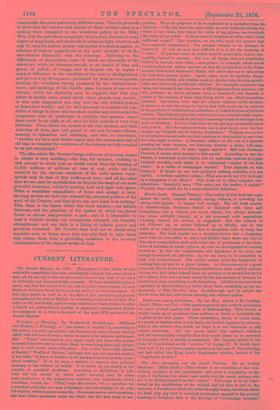Principles of Plutology. By Wordsworth Donisthorpe.
and Norgate.)—Plutology, or " the science of wealth," is, according to the author, a purely speculative and therefore an exact science, dealing solely with the laws of value, which he holds to be uniform and invari- able. " Value," unfortunately, is a vague word. and those who profess to treat of its laws and to reduce them to something fixed and definite have to work under many difficulties. The author has a high opinion of Smith's " Wealth of Nations," and says that any one who has studied it has little " to learn or unlearn in his passage thence to modern econo- mical treatises." It is, he says, a mistake to suppose that political economy is the science of wealth. It is rather an art aiming at the solution of practical problems. According to McCulloch, it asks what are the moans by which man's industry may be made most productive of the necessaries, comforts, and enjoyments which constitute wealth, dec. " This," says the author, "is a question for a practical politician or a man of business, and has nothing to do with his inquiry, which is-purely scientific. He cannot answer such questions, any more than a geometer could say which was the best form of tra- pezium. What he proposes to do is explained by a quotation from Der Quincey :—" My hat bears the same value as year umbrella, double the value of my shoes, four times the value of my gloves, one-twentieth the value of my watch. Of these several relations of value, what is thn. sufficient cause?" This question, we are told, up to the present day has remained unanswered. The present volume is an attempt to answer it. It will be seen how difficult it is to fix the meaning of "value." To possess value, an article must bo practically, that is, per- ceptibly, limited in amount. But not all things that are practically limited in amount have value,—mosquitoes, for example, which are so valueless that our author assures us that the proprietors of the West- minster Palace and Grosvenor Hotels will allow any one to take away all that they possess gratis. Again, value must bo carefully distin- guished from utility, and utilities mast be divided into directly-gratifi- cable And indirectly-gratificable utilities. For example, a hammer has value, not because it has the power of affording immediate pleasure, (for who professes to derive pleasure from a hammer ?) but because it assists in the creation of some other thing which can afford immediate pleasure. Our author feels that his subject requires subtle analysis. It seems to us that the terms he has to deal with never can be reduced to the precision of mathematical definitions, or indeed to those of physical science. This difficulty gives the whole inquiry an uncomfortable vague- ness, and endless holes can be picked in reasonings which at first sight look quite satisfactory. It is not often that we can get any amusement out of such a book. But we confess we have had a good laugh over the last chapter, on "Capital and its Various Definitions." Politieal economists or plutologists cannot make up their minds as to what capital is, and what the term ought to cover. A thousand colliers on the eve of a monster meeting eat their suppers, not knowing whether a strike will ova-, mence on the morrow. Is their supper capital ? Mill and. Profeeaer - Fawcett, it seems, were unequal to this puzzle. According to one de- finition, a warehouse is not capital, but an umbrella, because it, is.pap. ticularly movable, may claim to be considered " capital of the first water." Is a bottle of champagne capital? That depends on who drinks it. If drunk by one who produces nothing valuable, it is not capital. A further question arises,—What are we to say if it is drunk by a clergyman or an officer ? This loads on to other complex con-. siderations. Somebody says, "The value, not the matter, is capital."' We think there could not be a more admirable definition.






























 Previous page
Previous page